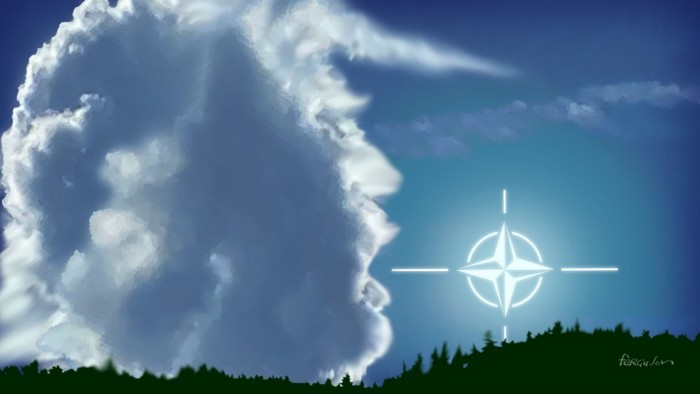Unlock the White House Watch newsletter for free
Your guide to what Trump’s second term means for Washington, business and the world
Fear of Russia brought the western alliance together. Now fear of Russia threatens to break it apart.
The North Atlantic Treaty Organization was formed in 1949 by the US, Canada and European allies to deter Moscow. But if the Trump administration now tries to force Ukraine to accept a partial defeat in its war with Russia, America will be widely seen in Europe as rewarding Russian aggression. If the Nato allies can no longer agree on the threat they face — and how to deal with it — their whole alliance is at risk.
The Atlantic alliance has survived many deep disagreements over the decades — from Suez in 1956 to the wars in Vietnam and Iraq — because there was always an understanding that, ultimately, the US and its European allies were on the same side.
The US-European partnership was based on shared interests and values. Throughout the cold war, the shared interest was the containment of the Soviet threat. The shared value was the defence of democracy. Even after the end of that war, the one on terror and the protection of Europe’s new democracies gave Nato a common purpose.
But that common understanding is now fraying. A disastrous conclusion to the war in Ukraine could snap it altogether.
Over the past week, the US and Europe have been pushing different peace plans for Ukraine. The Europeans reject key elements of the Trump plan — above all, the legal recognition of Russia’s annexation of Crimea.
Donald Trump seemed to have a friendly conversation with Volodymyr Zelenskyy of Ukraine in Rome over the weekend — and the US leader has also ventured a rare criticism of Vladimir Putin. But America has not withdrawn any of the elements of its peace plan that Europeans and Ukrainians find so objectionable.
Underlying that disagreement are profoundly different visions of international security — and where the threat of the next war is coming from. The Europeans believe that rewarding Russian aggression in Ukraine would make it much more likely that Putin will attack the rest of Europe — starting with the Baltic states.
The Trump administration sees things very differently. It is concerned that the US could eventually be dragged into a direct conflict with Russia. Trump himself has warned repeatedly of the risk of a third world war. The Biden administration was also concerned by the risk of escalation with Russia. But, unlike Trump, it shared Europe’s deep suspicion of Putin and a determination that Russian aggression should not be rewarded.
The divergence in security visions now goes far beyond the question of how to end the Ukraine war. America’s allies have to face the reality that Trump is directly threatening the territory of two Nato members.
Trump has repeatedly vowed to incorporate Greenland — which is an autonomous part of Denmark — into the US. In a recent interview with Time magazine, he also reiterated his desire to turn Canada into America’s 51st state. Trump has not made overt military threats against Canada. But he clearly wants to extinguish its existence as an independent country.
Combine these authoritarian instincts, his threats to Nato allies and his evident sympathy for Putin — and it is hard to argue that Nato is still an alliance based around shared values.
Indeed, the conflict in values is now out in the open. Both the US and its largest European allies continue to argue that they are defending democracy. But both believe (or claim to believe) that democracy is under threat on the other side of the Atlantic.
In a now famous speech at the Munich Security Conference, JD Vance accused America’s European allies of suppressing free speech and of being afraid of their own people. The vice-president’s accusations were met with cold fury in most of Europe — where Trump’s efforts to overturn the 2020 US presidential election and his attacks on the US judiciary, media and universities have not escaped attention.
The Trump administration and its European allies now preach two conflicting visions of western values. The Vance-Trump vision is ethno-nationalist, culturally conservative and illiberal. The European one is internationalist and based on the law and liberal institutions.
The division is all the more bitter because both sides believe this is an existential fight for political survival — and look to allies on the other side of the Atlantic. The Trump administration wants to work with nationalist populists like Hungary’s Viktor Orbán, Slovakia’s Robert Fico or Britain’s Nigel Farage. The major European governments were hoping for Kamala Harris to win the US presidency and are now desperately counting the days until America’s midterm elections.
The transatlantic alliance used to be a bipartisan commitment that could easily survive changes of government. It now may only work if liberals — or illiberals — are in power on both sides of the Atlantic at the same time.
Even then there are grounds for doubt. As well as shared values and interests, the western alliance depends on trust. All sides need to know that it will endure, whatever happens in the next elections. But Europeans and Canadians now know that the US is capable of electing Trump twice. They can no longer take American steadfastness for granted.
Read the full article here




